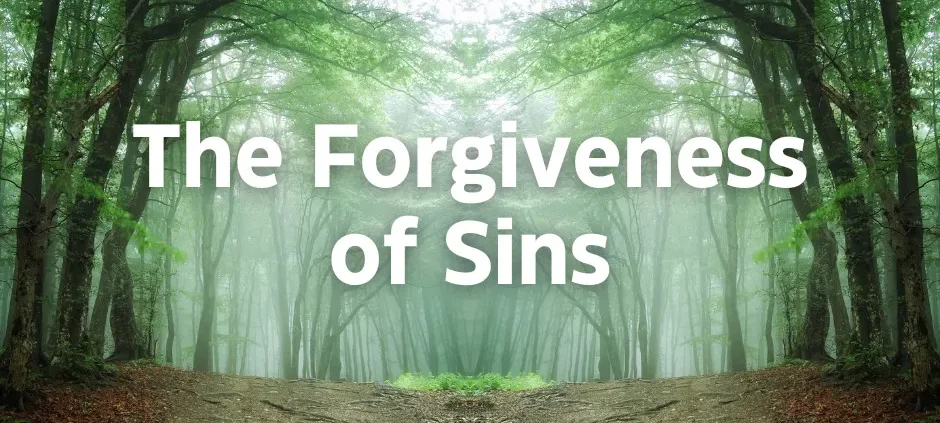Preaching About the Forgiveness of Sins
Preaching About the Forgiveness of Sins
Preaching about the forgiveness of sins can be one of the most exciting messages in this series on preaching doctrine. The idea that God forgives all our sins is foundational to any doctrine that we have from the Bible. So, let’s explore how preaching on this can enrich your congregation’s understanding of God, of themselves, of the church, and of the world.
Two Problems To Address
As I think about this theme of preaching about the forgiveness of sins today, there are a couple of challenges that need addressing. The first problem is a bit of a surprise.
People Who Feel Too Good About Themselves
At the time of this writing there is an upheaval going on in the Church in the United States. In many cases that upheaval has to do with how christians, denominations and churches are considering human sexuality. My own denomination has wrangled with what to believe about homosexual sex. Finally, it was decided that this kind of sex is sin in God’s sight, and that’s what we must believe. The challenge here is that I have seen those people, then, who feel superior, or not quite so much sinners. This kind of attitude needs to be confronted.

Version 1.0.0
One of the most impactful books in my life was written many years ago by a man named John Fisher. The title is: 12 Steps For The Recovering Pharisee (Like Me). Fisher defines a Pharisee as someone who has defined a level of religiosity that he or she can keep, and then looks down on others who don’t or can’t keep that same level.
An incredibly powerful passage for me in this regard for me is the story of the tax collector and the Pharisee who go into the temple to pray. Here is how Jesus pictures these two contrasting approaches to God.
The Parable of the Pharisee and the Tax Collector
9 To some who were confident of their own righteousness and looked down on everyone else, Jesus told this parable: 10 “Two men went up to the temple to pray, one a Pharisee and the other a tax collector. 11 The Pharisee stood by himself and prayed: ‘God, I thank you that I am not like other people—robbers, evildoers, adulterers—or even like this tax collector. 12 I fasttwice a week and give a tenth of all I get.’
everyone else, Jesus told this parable: 10 “Two men went up to the temple to pray, one a Pharisee and the other a tax collector. 11 The Pharisee stood by himself and prayed: ‘God, I thank you that I am not like other people—robbers, evildoers, adulterers—or even like this tax collector. 12 I fasttwice a week and give a tenth of all I get.’
13 “But the tax collector stood at a distance. He would not even look up to heaven, but beat his breast and said, ‘God, have mercy on me, a sinner.’
14 “I tell you that this man, rather than the other, went home justified before God. For all those who exalt themselves will be humbled, and those who humble themselves will be exalted.”
The Problem of the Self-Righteous
When preaching about the forgiveness of sins, you should confront self-righteousness. When John Fisher wrote the 12 steps book for Pharisees, he noted in himself the very human desire to look down on people. In fact, step one of such recovery is to recognize that I love to look down on people. I like it more than almost anything, to feel that I am above, more important, or better than other people.
My Recent Experience
I experienced this not too long ago. I was invited to visit a church that was made up of ex-cons. These people who had done time had gathered into one congregation. As the service began I was deeply disappointed in the music. I am a musician, and my church has a talented praise team leading us. So, when a keyboardist who was barely capable, a drummer who had trouble keeping the beat, and another vocalist who didn’t seem to know all the words began worship, I immediately felt like my preferred style of worship was superior.
But then they began singing about the power of God to change lives. These people had lived this reality. Cheers rose out of these people with multiple tattoos. Hugs abounded. Praises rose. And I realized, that I was the Pharisee in the group. Like the tax collector, these people were experiencing God in a way that I didn’t connect.
I went home in deep repentance.
Conclusion
An old catechism (the Heidelberg) asks in the second question how we can enjoy confidence and strength in life and in death. We need, the authors wrote, to understand three things: 1) How great my sins and misery are; 2) how I am set free from my sins and misery; 3) how I am to thank God for such deliverance. You would do well when preaching about the forgiveness of sins to call people to a recognition of their own sinfulness.
In the next post we’ll explore the second problem; of those whose shame keeps them from a sense of forgiveness.



